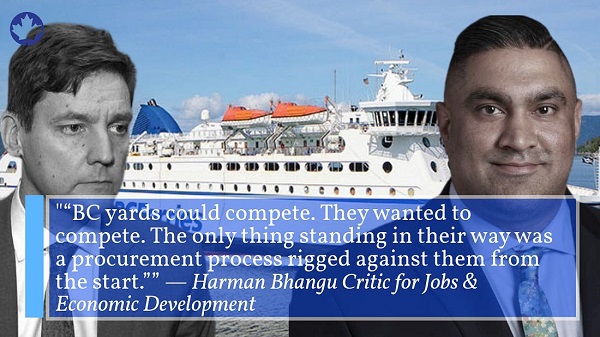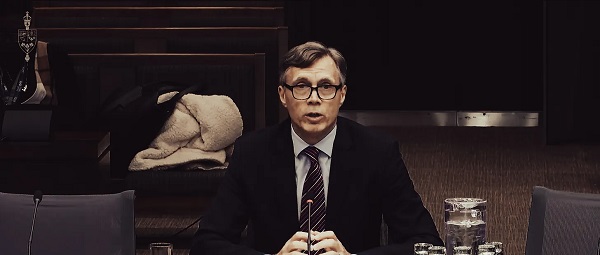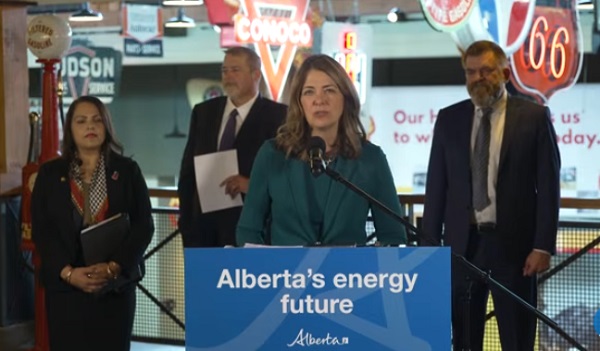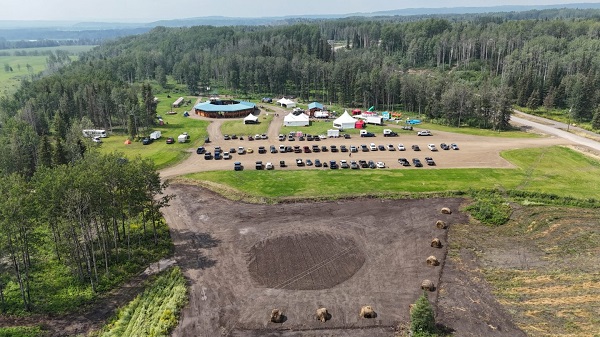Alberta
Premier Kenney addresses Alberta’s COVID-19 economic crisis

From the Province of Alberta
Additional financial support for Albertans and employers
More relief is on the way for Albertans and Alberta employers.
The government has made three significant decisions that will give Albertans and Alberta employers additional supports as they deal with the impacts of the COVID-19 crisis.
“Our priority is to keep our province strong while we get through these difficult times together. We’re doing everything we can to support Albertans and Alberta employers through this crisis. That’s why we’re focused on creating tangible savings for households and freeing up necessary cash for businesses to help them through these unprecedented times.”
Education property tax freeze
During a pandemic, Alberta households should not need to worry about paying additional property taxes.
- The government will immediately cancel the decision made in Budget 2020 and will freeze education property taxes at last year’s level.
- Reversing the 3.4 per cent population and inflation adjustment will save Alberta households and businesses about $87 million in 2020-21, which means $55 million for households and $32 million for employers.
- The government expects that Albertans and Alberta businesses will fully realize these savings and that municipal property tax levels will not be increased as a result of the lower provincial education property tax levels.
Education property tax deferral for business
When Alberta businesses are operating, they employ Albertans who can support themselves, their families and help keep the economy running. Effective immediately, the government will defer education property tax for businesses for six months.
- In the next six months, $458 million in cash will remain with employers to help them pay employees and continue operations.
- The government expects municipalities to set education property tax rates as they normally would, but defer collection. Deferred amounts will be repaid in future tax years.
- The government encourages commercial landlords to pass on these savings to their tenants through reduced or deferred payments. This will help employers continue to manage their debts, pay their employees and stay in business.
- Businesses capable of paying their taxes in full are strongly encouraged to do so. This will assist the province in being able to support Albertans through this pandemic.
“Eliminating the scheduled adjustment of education property taxes and deferring collection of non-residential property taxes will result in savings to Albertans and improved business cash flow. This measure will help Alberta households and businesses during this time – we want to keep Albertans working while we get through these difficult times together.”
WCB premiums deferral for private sector businesses and support for small and medium businesses
Private sector employers can save money on their WCB premium payments at a time when they need it most. These actions ensure the sustainability of the workers’ compensation system and that injured workers continue to receive the benefits and supports they need to return to work.
- Private sector employers will have immediate financial relief by deferring WCB premiums until early 2021, effectively for one year.
- Employers who have already paid their WCB premium payment for 2020 are eligible for a rebate or credit.
- For small and medium businesses, the government will cover 50 per cent of the premium when it is due.
- Large employers will also receive a break by having their 2020 WCB premium payments deferred until 2021, at which time their premiums will be due.
- Paying 50 per cent of small and medium private sector WCB premiums for 2020 will cost government approximately $350 million.
Additional measures to help families, students and employers
Previously announced measure taken by the province to protect Albertans and assist businesses include:
- The collection of corporate income tax balances and instalment payments is deferred until Aug. 31, 2020. This gives Alberta businesses access to about $1.5 billion in funds to help them cope with the COVID-19 crisis.
- $50 million to support emergency isolation for working adult Albertans who must self-isolate, including persons who are the sole caregiver for a dependent who must self-isolate, and who will not have another source of pay or compensation while they are self-isolated. It is distributed in one payment instalment to bridge the gap until the federal emergency payments begin in April.
- Utility payment deferral for residential, farm, and small commercial customers to defer bill payments for the next 90 days and ensure no one is cut off from electricity and natural gas services during this time of crisis.
- A six-month, interest-free moratorium on Alberta student loan payments for all individuals who are in the process of repaying these loans.
COVID-19 a ‘devastating blow’ to mountain towns that rely on tourism
Alberta
Jason Kenney’s Separatist Panic Misses the Point

By Collin May
Time was a former political leader’s expected role was to enjoy retirement in relative obscurity, resisting the urge to wade into political debate. Conservatives generally stick to that tradition. Ralph Klein certainly did after his term ended. Stephen Harper has made no attempt to upstage his successors. Yet former Alberta Premier Jason Kenney can’t seem to help himself.
From the boardroom of Bennett Jones, one of Calgary’s oldest law firms, Kenney recently offered his thoughts on the unspeakable horrors that await the province should it entertain a debate (perhaps even call a referendum) on separating from Canada. While dismissing Alberta separatists as a “perennially angry minority”, Kenney nevertheless declared a vote on separation would “would divide families, divide communities, divide friends for no useful purpose.” Business partnerships, church and community groups, even marriages and families would break apart, he warned, “shredding the social fabric of the province.”
It was a remarkable burst of untethered hyperbole, but it says more about the former premier than it does about the province he once led.
Kenney’s take on the history of Alberta separatism is telling. It’s a 50-year-old “discredited concept,” he said, whose acolytes “couldn’t get elected dogcatcher in this province.” Exhibit A in his analysis was Gordon Kesler, an Alberta rodeo rider and oil company scout who believed independence was the only way to save Alberta from Ottawa’s depredations. In a 1982 byelection, Kesler got himself very much elected as an MLA under the Western Canada Concept banner. He later lost in the general election to Peter Lougheed’s Progressive Conservatives, but Lougheed did not belittle Albertans for entertaining separatist notions. Instead, he asked for a mandate to fight Ottawa more effectively — and got it.
Kenney, by contrast, ridicules separatists while simultaneously painting them as an existential menace. Worse, he likens them to followers of Vladimir Putin and (perhaps even worse?) Donald Trump. “[I]f you just follow them on social media,” he claimed, one will quickly see that they cheered on Putin’s attack on Ukraine and Trump’s threat of making Canada the 51 st state.
Kenney’s latest intervention fits a pattern. As premier from 2019 to 2022, he could not resist trying to stamp out dissent. During the pandemic, he alienated political allies by dismissing their concerns about mandatory vaccines with contempt. He saw his ouster as UCP leader as the result of a Trumpian-inspired or “MAGA” campaign. UCP party faithful, however, said their rejection of him had far more to do with his top-down leadership style and habit of “blaming other people for the errors he made.”
What’s especially striking about Kenney’s separatist obsession is that he seems to understand as little about Albertans now as he did while premier. Albertans have long debated separation without the province descending into chaos. When Kesler won his seat, people talked about separation, argued its pros and cons, but couples were not running to their divorce lawyers over the issue and business partners were not at each other’s throats.
And there are legitimate reasons for concern about Canada’s social and political structure, as well as the role provinces play in that structure. Canada’s institutions operate largely on an old colonial model that concentrates power in the original population centre of southern Ontario and Quebec. This has not, and does not, make for great national cohesion or political participation. Instead, it feeds constant fuel to separatist fires.
The current threat to Canadian identity comes as well from the ideological commitments of our federal government. Early in his time as Prime Minister, Justin Trudeau declared Canada to be a “post-national” state. This sort of moniker is consistent with the popularly-designated woke doctrine that eschews the liberal nation-state, democratic procedures and individual freedom in favour of tribalist narratives and identity politics.
The obsession with post-nation-state policies has initiated the dissolution of the Canadian nation regardless of whether Quebeckers or Albertans actually vote for separation. We are all becoming de facto separatists within a dissolving Canada, a drift that current Prime Minister Mark Carney’s ineffective “elbows up” attitude has done nothing to reverse.
Kenney’s panicked musings about Alberta separatists would have us believe the province need only continue the fight for a better deal within the Canadian federation. Kenney pursued just such a policy, and failed signally to deliver. For too many Albertans today, his advice does not reflect the political reality on the ground nor appreciate the worrying trends within Canadian institutions and among our political class.
Kenney likes to associate himself with Edmund Burke, the father of conservatism and defender of venerable institutions. But Burke was known as much in his day for his sympathies with the American revolutionaries and their creation of an experimental new republic as he was for his contempt towards the French Revolution and its Reign of Terror. Burke’s conservatism still linked real actions with true words. It would be advisable, perhaps, to keep our own political language here in Alberta within the bounds of the plausible rather than fly off into the fanciful.
The original, full-length version of this article was recently published in C2C Journal.
Collin May is a lawyer, adjunct lecturer in community health sciences with the Cumming School of Medicine at the University of Calgary, and the author of a number of articles and reviews on the psychology, social theory and philosophy of cancel culture.
Alberta
Alberta’s E3 Lithium delivers first battery-grade lithium carbonate

E3 Lithium employees walk through the company’s lithium pilot plant near Olds
From the Canadian Energy Centre
E3 Lithium milestone advances critical mineral for batteries and electrification
A new Alberta facility has produced its first battery-grade lithium carbonate, showcasing a technology that could unlock Canada’s largest resources of a critical mineral powering the evolving energy landscape.
In an unassuming quonset hut in a field near Olds, Calgary-based E3 Lithium’s demonstration plant uses technology to extract lithium from an ocean of “brine water” that has sat under Alberta’s landscape along with oil and gas for millions of years.
Lithium is one of six critical minerals the Government of Canada has prioritized for their potential to spur economic growth and their necessity as inputs for important products.
“The use for lithium is now mainly in batteries,” said E3 Lithium CEO Chris Doornbos.
“Everything we use in our daily lives that has a battery is now lithium ion: computers, phones, scooters, cars, battery storage, power walls in your house.”
Doornbos sees E3 as a new frontier in energy and mineral exploration in Alberta, using a resource that has long been there, sharing the geologic space with oil and gas.
“[Historically], oil and water came out together, and they separated the oil from the water,” he said.
“We don’t have oil. We take the lithium out of the water and put the water back.”
Lithium adds to Canada’s natural resource strength — the country’s reserves rank sixth in the world, according to Natural Resources Canada.
About 40 per cent of these reserves are in Alberta’s Bashaw District, home to the historic Leduc oilfield, where E3 built its new demonstration facility.
“It’s all in our Devonian rocks,” Doonbos said. “The Devonian Stack is a carbonate reef complex that would have looked like the Great Barrier Reef 400 million years ago. That’s where the lithium is.”
Funded in part by the Government of Canada and the Government of Alberta via Alberta Innovates and Emissions Reduction Alberta (ERA), the project aims to demonstrate that the Alberta reserve of lithium can be extracted and commercialized for battery production around the world.
E3 announced it had produced battery-grade lithium carbonate just over two weeks after commissioning began in early September.
In a statement, ERA celebrated the milestone of the opening of the facility as Alberta and Canada seek to find their place in the global race for more lithium as demand for the mineral increases.
“By supporting the first extraction facility in Olds, we’re helping reduce innovation risk, generate critical data, and pave the way for a commercial-scale lithium production right here in Alberta,” ERA said.
“The success from this significant project helps position Alberta as a global player in the critical minerals supply chain, driving the global electrification revolution with locally sourced lithium.”
With the first phase of the demonstration facility up and running, E3 has received regulatory permits to proceed with a second phase that involves drilling a production and injection well to confirm brine flow rates and reservoir characteristics. This will support designs for a full-scale commercial facility.
Lithium has been highlighted by the Alberta Energy Regulator (AER) as an emerging resource in the province.
The AER projects Alberta’s lithium output will grow from zero in 2024 to 12,300 tonnes by 2030 and nearly 15,000 tonnes by 2034. E3 believes it will beat these timeframes with the right access to project financing.
E3 has been able to leverage Alberta’s regulatory framework around the drilling of wells to expand into extraction of lithium brine.
“The regulator understands intimately what we are doing,” Doornbos said.
“They permit these types of wells and this type of operation every day. That’s a huge advantage to Alberta.”
-

 espionage13 hours ago
espionage13 hours agoStarmer Faces Questions Over Suppressed China Spy Case, Echoing Trudeau’s Beijing Scandals
-

 Business2 days ago
Business2 days agoJobs Critic says NDP government lied to British Columbians and sold out Canadian workers in billion dollar Chinese ferries purchase
-

 Alberta1 day ago
Alberta1 day agoJason Kenney’s Separatist Panic Misses the Point
-

 Energy3 hours ago
Energy3 hours agoOttawa must eliminate harmful regulations to spur private investment in pipelines
-

 Automotive1 day ago
Automotive1 day agoBig Auto Wants Your Data. Trump and Congress Aren’t Having It.
-

 Business4 hours ago
Business4 hours agoLabour disputes loom large over Canadian economy
-

 Business1 day ago
Business1 day agoDemocracy Watch Drops a Bomb on Parliament Hill
-

 Business4 hours ago
Business4 hours agoDaily Caller EXCLUSIVE: Chinese Gov’t-Tied Network Training Illegal Immigrants To Drive Big Rigs In US




